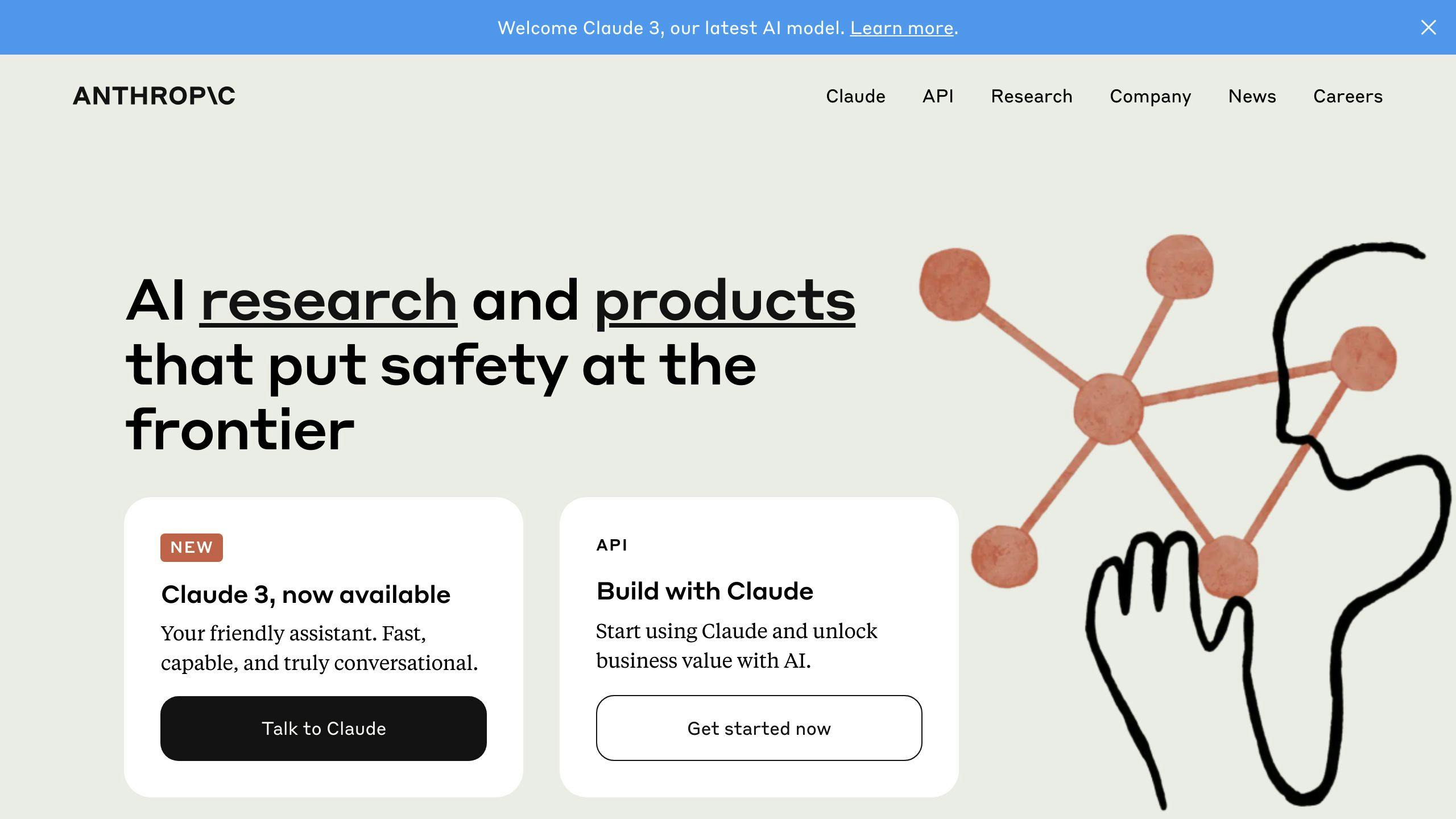Imagine having a digital co-founder that understands every aspect of your business and can help you make smarter decisions. This is not just a dream; AI and robotics are making it possible. Here's what you need to know:
- AI-powered digital co-founders can manage operations, plan finances, strategize growth, handle HR, and ensure legal compliance.
- They stand out by understanding your business model, being goal-oriented, having a growth mindset, exercising judgment, and making proactive contributions.
- Key technologies behind these digital co-founders include Natural Language Processing for conversational understanding and Reinforcement Learning for optimization and strategy.
- Creating a customized digital co-founder involves ingesting relevant data sources, iterative training, and ensuring it manages ongoing responsibilities effectively.
- Case studies demonstrate significant value to businesses, including improved supply chain management, smart pricing, innovative product identification, and efficient hiring.
However, it's crucial to implement these technologies with care, ensuring human judgment remains in the loop and decision-making is unbiased and ethical. The future outlook for AI-powered digital assistants is bright, promising to revolutionize business planning and operations while maintaining ethical standards and human oversight.
Defining the Role and Responsibilities
A digital co-founder is a smart system, kind of like a robot partner for your business. It knows a lot about what your company does, your goals, and who your customers are. Here’s what it helps with:
-
Operations Management: It looks after the day-to-day stuff like keeping track of inventory and making sure deliveries go smoothly. It’s like having an eye on everything to prevent problems.
-
Financial Planning: It keeps an eye on money matters, helps plan budgets, and makes sure bills and employees get paid on time. It’s like a finance guru that’s always on.
-
Growth Strategy: It watches the market, spots opportunities for the business to grow, and comes up with ideas for new products or marketing moves.
-
HR Management: It assists in hiring new people, keeps workplace rules up to date, and makes sure the company follows the law.
-
Legal and Compliance: It stays sharp on laws and rules that affect the business, helping you avoid legal troubles.
This isn’t just any chatbot. It’s like a smart partner that really gets your business. It uses what it knows to help make big decisions and keep things running smoothly.
Distinguishing Features Compared to Other AI Tools
Here’s how a digital co-founder stands out from simpler AI tools:
-
Business Model Understanding: It really digs into who buys your products and why, plus how your business makes money.
-
Goal Orientation: It knows what the business aims to achieve and uses that to guide its advice and actions.
-
Growth Mindset: It’s always learning from new information and past experiences to get better at helping your business.
-
Judgment and Nuance: It can handle tricky situations with a kind of understanding that goes beyond just facts and figures.
-
Proactive Contributions: It keeps an eye out for new chances to grow the business and tackles problems before they get big.
A well-set-up digital co-founder is more than just a tool; it’s a game-changer for how businesses plan, operate, and grow.
The Underlying Technology
Natural Language Processing for Conversational Understanding
Natural language processing, or NLP, is a big deal for digital co-founders because it lets them understand and talk like humans. Here’s how it works in simple steps:
- Breaking Down Language: It splits sentences into smaller pieces, like words and phrases, so it can understand them better.
- Figuring Out Roles: It labels each word based on its job in the sentence, like whether it’s a noun or a verb.
- Identifying Key Info: It spots important names, places, and other details in the conversation.
- Understanding Feelings: It figures out if the words are happy, sad, or angry.
By doing all this, NLP helps digital co-founders get what people are saying in a deep way. This means they can chat in a way that makes sense and feels natural.
Reinforcement Learning for Optimization and Strategy
Reinforcement learning is a smart way for digital co-founders to get better at making decisions. Here’s how it helps them learn:
- Setting Goals: It starts with knowing what success looks like for the business.
- Trying Things Out: It tests different actions to see what happens.
- Learning From Feedback: It pays attention to what works and what doesn’t.
- Getting Smarter Over Time: It keeps improving its choices based on what it learns.
This process lets digital co-founders figure out the best ways to help a business grow. They learn from experience, just like a person, which makes them really good at giving advice that works. This is a big part of making AI for business model expansion work well.
By combining NLP for understanding language and reinforcement learning for making smart choices, digital co-founders can really get to know a company and help it succeed. It’s all part of the digital transformation that’s changing how businesses operate, making things like AI implementation and AI strategy crucial for staying ahead.
Developing a Customized Digital Co-Founder
Ingesting Relevant Data Sources
To make a digital co-founder that really understands your business, it needs to look at a lot of different information:
-
Financial records - This includes things like how much money you made, what you spent, and your profits. It helps the AI see patterns and how well the business is doing.
-
Past business decisions - Information on big choices you've made, like starting new products or marketing strategies, teaches the AI about what works and what doesn't.
-
Company wiki, documents and conversations - Looking at all the notes, emails, and talks inside your company gives the AI a deep dive into how things work and what's important to your team.
-
Expert advice - Learning from people who know a lot about your industry or business helps the AI understand the best practices and avoid common mistakes.
By taking in all this data, the AI gets a full picture of your business from money matters to daily operations and team culture.
Iterative Training with Human Guidance
Teaching the digital co-founder to make smart decisions involves a few steps:
-
Supervised learning - Experts in your business help by saying 'yes' to good AI decisions and 'no' to bad ones. This guides the AI in the right direction. They also check for anything the AI might be missing.
-
Reinforcement learning simulations - The AI practices by going through different business scenarios to learn what choices lead to success.
-
Active learning - If the AI isn't sure about something, it asks for help instead of guessing. This makes sure it learns about the most tricky parts.
-
Version testing - Trying out different versions of the AI to see which one makes the best decisions helps improve it over time.
-
Incremental upgrades - As your business changes, you keep adding new data and advice to the AI so it stays up-to-date.
With the right setup and ongoing training, the AI becomes better and better at being a helpful digital co-founder.
Ongoing Responsibilities Managed by the AI
Financial Planning and Resource Allocation
The AI co-founder takes care of a lot of the money stuff to help keep costs down and profits up:
-
Accounting and Bookkeeping - It keeps track of all money coming in and going out, sorts spending, and gets financial reports ready. This is useful for taxes and understanding money flow.
-
Budgeting and Forecasting - It makes budget plans that match growth goals and watches if spending is on track. It adjusts plans when needed.
-
Asset Optimization - It looks after inventory, equipment, buildings, and other assets to get the most use and value from them. This includes keeping track of asset value loss for taxes.
-
Payroll and Billing - It manages all employee payments smoothly, including tax payments. For client billing, it sends out bills and keeps an eye on payments.
With the AI keeping an eye on finances daily and helping with big money choices, it's like having a super quick finance team.
Growth Initiatives and Innovation Pipeline
The digital co-founder taps into the latest tech to help the business grow in several important ways:
-
Market Research - It keeps an eye on the market, finds new chances, and checks interest for possible products. This helps with coming up with new ideas.
-
Business Modeling - It tries out and tests new business ideas to see which ones might work best before going ahead with them.
-
Launch Management - For new products, services, or projects, it takes care of the technical setup, marketing, partnerships, and other important tasks.
-
Performance Tracking - It keeps track of how well each big project is doing to figure out what's successful and what needs work. This helps make things better.
With the AI helping out, you get ideas based on data and automated help in starting new growth efforts - a big advantage. It removes the guesswork from creating new things.
sbb-itb-d1a6c90
Case Studies Demonstrating Value to Businesses
Anthropic

Anthropic's AI assistant Claude has been a game-changer for their business strategy, showing improvements of 10-20% in important areas. Here's a look at what it did:
- Better supply chain management: Claude looked at past sales, how much stock was on hand, and info from suppliers to make stocking and shipping smarter. This cut down on extra stock costs by 15%.
- Smart pricing: By understanding the market, competitors, and what customers are willing to pay, Claude suggested better prices that raised sales by 12%.
- Finding new products: Claude used market info to point out new product ideas. One suggestion turned into a product that now makes up 5% of sales.
- Hiring the right people: Claude helped pick candidates that really fit what the company needed. People hired with its help are doing 10% better on the job.
Using Claude, Anthropic can make quick, informed decisions, which is a big plus in a fast-changing market.
Hypothetical Example Company
Imagine a small shop selling household items that used an AI assistant to grow profits by 15% in less than a year. Here's how:
- Cutting buying costs: The AI looked at how the company buys things and found ways to save 8% by ordering in bulk and choosing less expensive suppliers.
- Keeping the right amount of stock: The AI predicted sales better by finding patterns in the data. This meant the company could have just enough stock, reducing storage costs by 7%.
- Improving store layout: By testing different ways to arrange products, the AI found the best setup that made people buy more, increasing sales.
- Better marketing emails: The AI figured out what customers liked and sent emails that were more likely to get clicks. These emails also led to people spending more per order.
By using AI to look at data and make suggestions, this fictional company was able to save money and sell more.
Implementing With Care
The Importance of Human Judgement in the Loop
Even though AI can do a lot, we still need people to make sure it's doing things right. Here's how humans stay involved:
-
Oversight: People check what the AI wants to do before it happens. This helps catch any mistakes.
-
Feedback Loops: Humans tell the AI how it's doing, helping it learn what works and what doesn't. This makes the AI smarter over time.
-
Validation Testing: We test the AI first to make sure we can trust its decisions in different situations.
-
Adjusting Trust Levels: The more the AI proves it can be trusted, the more we let it do. But we can always adjust how much freedom it has.
The idea is to have an AI that helps us think better, not replace us. Keeping humans in the loop means the AI is a helpful partner, not the boss.
Unbiased and Ethical Decision Making
For companies to trust an AI assistant, it needs to make fair choices and match their values. Here's how this is done:
-
Diverse Data: The AI learns from a wide range of information to avoid bias.
-
Thoughtful Programming: We check the AI's code for fairness and make sure it considers what's right and wrong.
-
Value Alignment: The AI understands the company's rules and culture to make sure its suggestions fit. It updates as the company changes.
-
Ongoing Assessments: Regular checks help catch any bias or misalignment, so we can fix it.
Keeping AI fair and in line with company values takes constant attention. But with careful work, digital assistants can help businesses succeed in the right way.
Conclusion and Future Outlook
AI-powered digital assistants are like having a super-smart helper for your business. They can look at a ton of information to really understand how your company works, what it needs, and how it can do better. They're great at giving advice on how to save money, use resources wisely, come up with new ideas, and grow your business.
These digital helpers can talk about complex stuff in a way that's easy to get, and they're always ready to help, day or night. Their ability to quickly process and analyze information is something no human can match.
In the future, these digital assistants will get even smarter, especially at predicting what's going to happen next, avoiding problems, and grabbing opportunities. We'll probably see more and more businesses, big and small, using them.
But, there are some things to watch out for. As we build and use these powerful tools, we need to make sure they're used in a good and fair way. We have to keep an eye on them and make decisions that are right and fair for everyone.
If we handle it carefully, AI digital assistants can change the way businesses plan and work. They won't take over jobs but will be like an extra team member who's really good at what they do.
Related Questions
Can I use AI to create a business?
Yes, AI tools can help you start planning your business by giving you ideas and info to think about. But remember, they can't do everything. It's still important to use your own knowledge and common sense to make a solid business plan that fits what you want to do and who you want to reach. Think of AI as a helpful assistant, not the boss.
How is AI used in digital business?
AI helps businesses understand data, make smart decisions quickly, talk to customers, and automate boring tasks. It's used in many ways, like answering customer questions with chatbots, suggesting products people might like, predicting what will sell, and improving how things are made. Basically, AI is a big helper in making businesses run better and meet customer needs.
What is an example of human AI collaboration?
A good example is in healthcare, where doctors work with AI to look at medical images, like X-rays. The AI can point out things that might be wrong, and then the doctor takes a closer look to make the final call. This teamwork helps doctors be more accurate and quick in diagnosing patients.
What is collaborative AI?
Collaborative AI is when different AI systems work together, sharing what they learn and helping each other get better. Think of it like a team of robots learning from each other to achieve a common goal. This can make AI more effective in tasks like learning new things or solving problems together.


